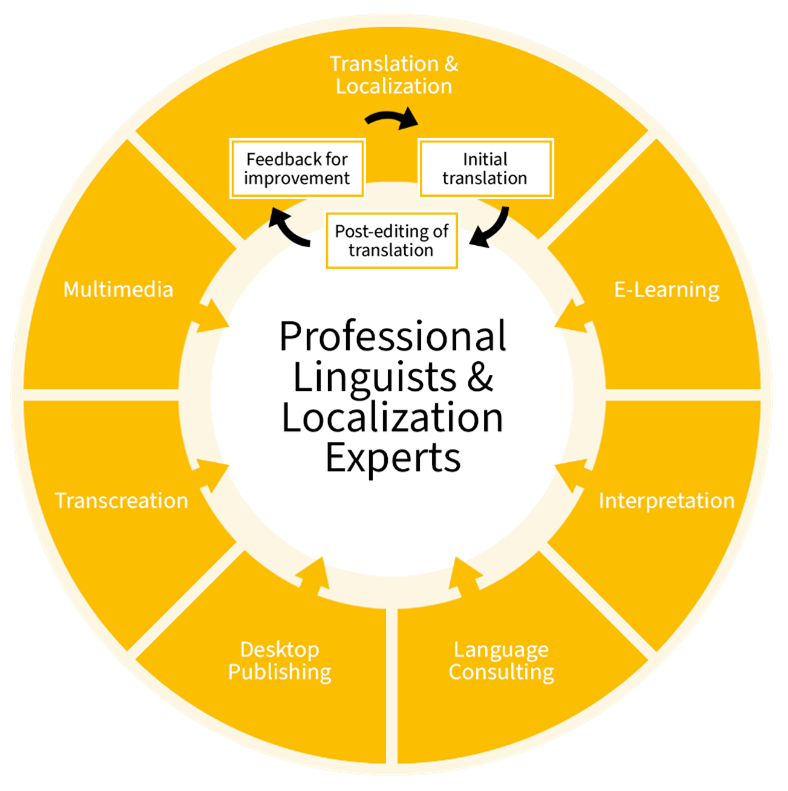TRANSLATION TECHNOLOGY
Advanced translation tools and technologies to enhance efficiency, consistency, and quality. Optimized for speed and accuracy.
The Changing Localization Industry Fueled by AI
As our world becomes more interconnected, the demand for translation and localization services grows. The diversity of languages and cultures ensures that this need will only increase. Advancements in artificial intelligence (AI) and automation are transforming how these services are delivered, bringing benefits as well as challenges that require careful management.
To meet these evolving demands, Apex has expanded its range of translation service options, allowing customers to select the solution that best suits their needs.
The Role of AI and Professional Linguists in Localization
AI and automation are reshaping the translation industry, with tools that analyze vast amounts of language data, making translations faster and more accessible. However, AI’s effectiveness relies on human input to train the system, and it still struggles with nuances, cultural context, and industry-specific terminology. Its output can sometimes be inaccurate or misleading, even reversing intended meanings in some cases.
Experts agree that AI’s role is to enhance translation quality and efficiency—not to replace skilled translators. By automating routine tasks, AI empowers professionals to focus on complex challenges, such as nuanced cultural adaptations and strategic planning. This collaboration between AI and human expertise leads to higher-quality, contextually accurate translations, reduced turnaround times, and cost efficiencies for clients.
AI’s self-learning nature means that quality improves over time. Early-stage implementations may have quality gaps, requiring careful supervision, especially in precision-critical industries like legal, medical, and technical fields.
 The Need for Professional Linguists and Localization Experts
The Need for Professional Linguists and Localization Experts
While AI handles many basic tasks, it cannot match the expertise of professional linguists who ensure accuracy, cultural relevance, and contextual soundness. Skilled translators play a vital role in refining AI-generated translations, making them suitable for complex projects. Relying solely on AI without expert oversight can lead to serious errors, from miscommunication to legal consequences.
Additionally, the effectiveness of AI translation depends not only on selecting the right machine translation (MT) engine, like ApexMT, but also on crafting precise prompts that guide the AI toward accurate and contextually appropriate output. Linguists and localization experts are essential in this process, as they understand how to create prompts that maximize the MT engine’s potential, producing high-quality translations that align with the intended message and cultural context.
Professional linguists play a crucial role in refining AI-generated translations, ensuring the output is accurate, culturally appropriate, and contextually relevant. They review and edit the machine-generated content, correcting nuances that AI might miss, such as idiomatic expressions, tone, and ensuring the appropriate register and style for the intended audience. Their expertise bridges the gap between raw AI output and polished, professional-quality translations.
Beyond translation, linguists are central to a range of localization services, as shown in the accompanying illustration. Their expertise spans multimedia, app, website, and software localization, e-learning, desktop publishing, language consulting, and interpretation. By overseeing these broader localization tasks, our expert linguists ensure precision, cultural relevance, and excellence across all project aspects—delivering tailored results that meet the unique needs of each target audience while optimizing costs.
The Benefits of AI for the Translation Industry
Despite its limitations, AI significantly boosts productivity in the translation industry. By handling repetitive tasks and speeding up workflows, AI increases efficiency, often leading to cost savings that can be passed on to clients.
AI also allows for different grades of translation services, enabling clients to choose from a spectrum of options that balance cost and quality. This flexibility provides access to both premium, human-led translations and lower-cost, machine-assisted solutions based on specific needs.
Evolving Scope of Localization Services
Localization services are expanding beyond simple text translation. Today’s translation service providers offer a range of services including interpretation, desktop publishing, audio and video localization, AI-powered OCR, content creation, and more. This evolution allows clients to rely on a single company for a broader range of language and localization needs.
Closing Insights
The localization industry is transforming, driven by AI and automation. While these technologies increase efficiency, they require skilled oversight to ensure quality. AI can boost productivity and provide clients with diverse options, but it must be thoughtfully guided by human expertise. As the industry evolves, clients can expect a wider range of services and more cost-effective solutions, maintaining high standards for global communication.
With a dedicated team and advanced AI tools, Apex is well-prepared to navigate the complexities of modern localization, offering adaptable, high-quality solutions for every client’s unique needs.
For your convenience, this article is also available as a downloadable White Paper.
Localization Tools to Enhance the Translation Process
To further streamline the translation process and deliver the highest quality results for our customers, Apex uses a range of specialized tools and technologies. These tools not only enhance accuracy and consistency but also offer greater flexibility and efficiency.
Language Asset Management
Our advanced translation technology includes tools like translation memories to boost both accuracy and consistency. By reusing previously translated content, we not only improve precision but also reduce project turnaround times and costs.
We also use terminology management and glossary tools to maintain client-specific glossaries, which can include abbreviations, branded terms, and “do not translate” lists. Consistent terminology is key to successful localization, and we tailor our approach to ensure it aligns with your unique requirements for every project.
Client Style Guides
Your preferences are at the heart of our translation process. By providing us with style guides, you ensure our linguists follow your specific requirements across all projects. We meticulously apply these style preferences, and our comprehensive quality assurance process guarantees consistency throughout.
Cloud-Based Translation Environment
Our cloud-based translation environment transforms the way we manage projects, offering exceptional flexibility and scalability. This system allows for seamless access to translation resources, enabling efficient collaboration and real-time data sharing. With secure, cloud-based infrastructure, we optimize workflows and deliver projects faster, all while ensuring the highest levels of security and adaptability.
DELIGHTED CUSTOMERS ACROSS THE GLOBE
Customers Sharing Their Experiences
See what clients say about Apex Translations’ language services.
CONNECT WITH THE APEX TRANSLATIONS TEAM
Ready to get started?
Please let us know how we can help you with your next translation project by completing our quote form below. If you would like to discuss your project needs with us, simply indicate so in the form, and we will call you at your convenience.
You can also reach us via e-mail at CustServ@apex-translations.com or by giving us a call at 317-942-0128.
"*" indicates required fields

